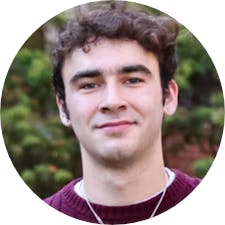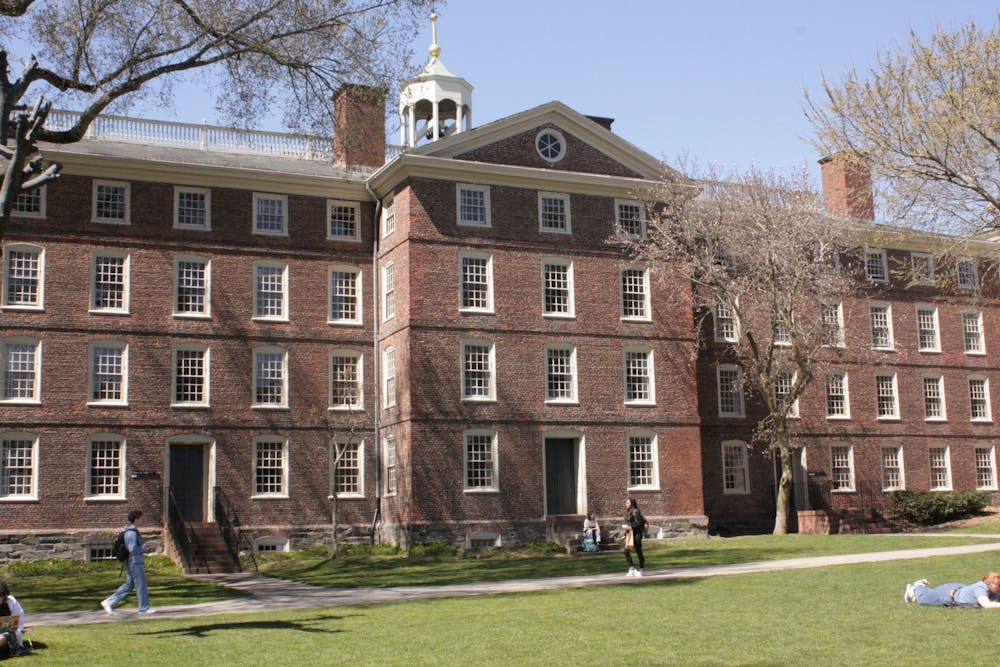A group of over 160 faculty members recently sent a letter to President Christina Paxson P’19 P’MD’20 urging the University's administration to call for a ceasefire in the ongoing violence in Israel-Palestine. The letter also called for the University to "affirm and advocate for the protection and ability" of community members to advocate for Palestinians through scholarship and activism.
Though she did not explicitly acknowledge the letter, Paxson responded to some of its demands at Tuesday’s faculty meeting.
Paxson said she had “been asked to make public statements to urge lawmakers to support a ceasefire, and to publicly decry censorship and intimidation of those who support Palestinian human rights on campuses elsewhere in the country.”
“I have to respectfully decline making public statements on these issues,” Paxson said.
Paxson also affirmed that “members of the Brown community who support Palestinian human rights through speech or scholarship will not be intimidated, censored or punished.”
“I wholeheartedly agree that there should be no ‘Palestinian exception’ to freedom of expression, and, in fact, I will go further: There are no exceptions to Brown’s clearly articulated policy on academic freedom and freedom of expression for views on any issue,” she said.
Paxson noted that although she releases public comments related to policy issues in higher education, she cannot comment on a ceasefire “precisely because of Brown’s commitment to academic freedom.”
“A university is not a single person, but a community of people who hold diverse views,” she said. “My responsibility, as president, is not to place a stamp of approval on the views of a subset of the community, even if that subset is large.”
Last spring, Paxson spoke about the importance of freedom of expression on college campuses during the Hillel International Israel Summit East 2023. At the time, members of Brown Students for Justice in Palestine and J Street U Brown urged Paxson to condemn annexation and violence against Palestinians, The Herald previously reported.
At Tuesday’s faculty meeting, Paxson reiterated her belief that her role is not to take positions, but rather to facilitate open discussion. “My responsibility is to ensure that individual members of the community are free to voice their views, including using their voices to urge lawmakers or other universities to take specific actions or, more generally, express their beliefs on matters of conscience,” she said.
Tuesday marks one month since Hamas’s attacks on several cities across southern and central Israel, which killed over 1,400 people. In the month since, Israel’s retaliation has targeted the Gaza Strip through airstrikes, blockades and a ground invasion, which has killed over 10,000 Palestinians in Gaza, the Associated Press reported. The United Nations has described the resulting humanitarian crisis as “unprecedented,” while UN experts have said they “remain convinced that the Palestinian people are at grave risk of genocide,” according to a Nov. 2 press release.
Paxson’s response follows several campus demonstrations and gatherings about the ongoing violence, including a vigil coordinated by Brown-RISD Hillel and the Rohr Chabad House to mourn Israelis who perished in the Oct. 7 attack or were taken hostage by Hamas. Brown SJP also held a vigil, as did Talk for Tomorrow, a coalition which emerged in mid-October. During an Oct. 25 walkout, around 500 students circled University Hall to demand that the University “end its complicity in the genocide in Gaza,” The Herald previously reported.
Paxson identified four key priorities as the Brown community grapples with the ongoing conflict: promoting safety, providing support services, rejecting harassment and discrimination and supporting freedom of expression.
Paxson noted that violence and threats have increased on college campuses nationally. On Oct. 29, a Cornell student, who has since been charged, anonymously posted threats targeting Jewish students and the Center for Jewish Living. At the University of Pennsylvania, students and faculty received threats after speaking at a pro-Palestine rally, the Daily Pennsylvanian reported.
“We are taking extensive steps to protect our campus, consulting regularly with local, state and federal law enforcement,” Paxson said at Tuesday’s meeting. “We pledge to do all we can to support members of our community who experience threats to their safety.”
Paxson also referred to prior communication from University officials, including resources shared by Vice President for Campus Life Eric Estes in an Oct. 10 email to the Brown community.
“Since Oct. 7, Brown has seen a small but concerning uptick in troubling reports of antisemitic and anti-Muslim (and) Arab incidents that involve other members of the Brown community or, in some cases, actors external to Brown,” Paxson said.
“Although we have not received many reports, even one is too many,” Paxson continued. “A pernicious effect of harassment is that even a few instances sow fear and distrust, which we cannot allow to take root at Brown.”
Paxson affirmed the University’s commitment to freedom of expression, echoing Provost Francis Doyle’s Nov. 3 email to the Brown community on frequently asked questions about protest and freedom of expression policies. The University’s statement on academic freedom, which was created in 1966, affirms freedom of religion, association, assembly, political activity and petition.
“Faculty and recognized student groups have the right to invite speakers of their choice to campus,” Paxson said at the meeting. “There are guardrails on time, place and manner that ensure that protests don’t infringe on the academic freedom of others or interfere with the normal functions of the University, including teaching and research.”
“Of course, speech that crosses the line into harassment based on religion, nationality, race, ethnicity or other characteristics is unacceptable,” she added.
Faculty members expressed concerns with Paxson’s statement and her refusal to comment on a ceasefire during the discussion period of the faculty meeting.
Director of the Center for Middle East Studies and Professor of International Studies, Anthropology and Middle East Studies Nadje Al-Ali said she heard from many colleagues at a recent conference that “the atmosphere on their campuses is worse than after 9/11.”
Al-Ali, who signed the letter, said that calling for a ceasefire is “a moral standard at this point.” She also mentioned that she is particularly worried about the potential “doxxing” of students, which has occurred at Harvard and New York University following pro-Palestine statements released after the Oct. 7 Hamas attacks.
“I have been very willing to take public stances on policy issues (or) proposed legislation that has a direct impact on universities,” Paxson said. “I have yet to see specific actions that restrict academic freedom on universities — that would be something that if we got to that point, I would think very hard about whether to address it.”
Other faculty members, including Professor of Palestinian Studies Beshara Doumani, urged individuals not to conflate criticism of Israel with antisemitism. Doumani was also a signatory of the letter. Paxson responded that the University remains “committed to freedom of expression, so critique of policy of any country in the world is fair — that’s fine — as long as we don't do things that cross into harassment and discrimination.”
“I get the impression that students don't know that it’s okay to talk about these (issues) in an open way,” Associate Professor of History and Religious Studies Nancy Khalek, another signatory, said at the meeting.
“It would be really great to be able to use our resources as a university to think about various events that we could do to educate our students about this” while being “more detailed and specific about what academic freedom means,” she added.
Paxson said she hopes that students talk to each other about the ongoing conflict and related issues.
“I actually don’t think students learn from reading statements from their university presidents,” she said. “I think they learn from discussion.”
“What I’ve heard from students is not so much that they’re afraid of the University squelching their speech, but they’re afraid of each other,” she said. “Some of the discussions in dorm rooms and outside of the classroom between students have been very, very harsh and hard.”
The discussion concluded with a question by Paxson: “You can control what happens in the four walls of your classroom, (but) how do we navigate and help our students in these other spaces?”
Clarification: This story has been updated to more accurately reflect the language used in the letter sent by faculty members to President Christina Paxson P'19 P'MD'20.

Ryan Doherty is the managing editor of digital content and vice president of The Herald's 135th editorial board. He is a junior from Carmel, NY who is concentrating in chemistry and economics. He previously served as a university news and science & research editor, covering faculty and higher education.





